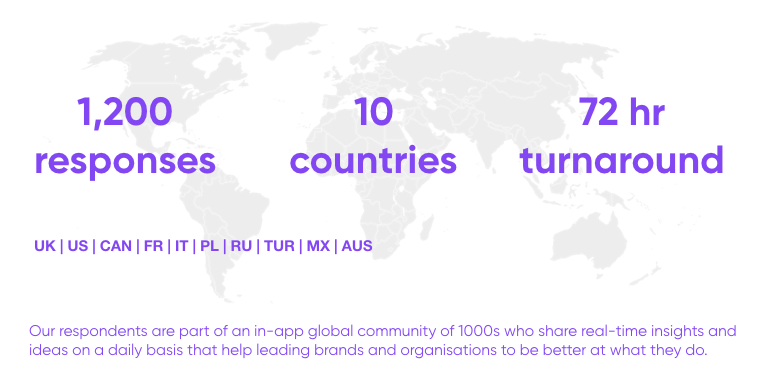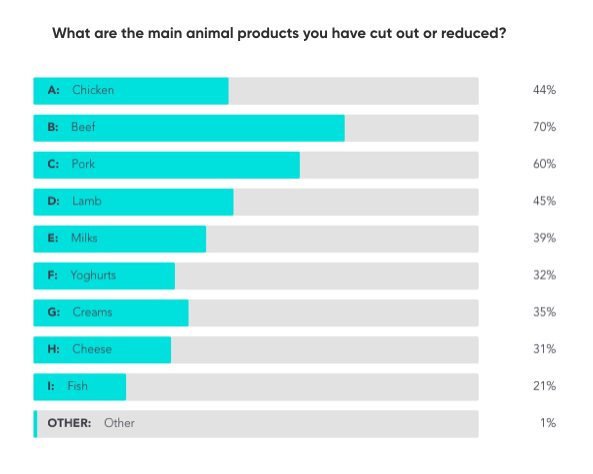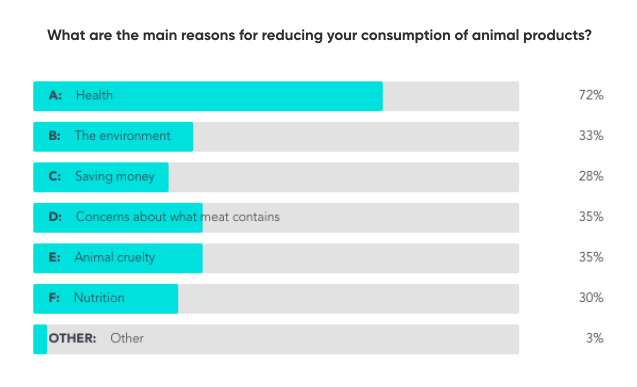It’s no secret that veganism is on the rise. With The Economist declaring 2019 as the year veganism went mainstream, and UK vegans increasing by 50% over the last decade (The Vegan Society), love them or loathe them, vegans are a growing force.
But do you have to be a vegan to be a vegan? The answer: not really. In a survey with 1,200 Bulbsharers, we found that more and more people are making vegan choices, while continuing to eat meat. What we’re seeing is a widespread introduction of mainly plant-based diets, with the occasional inclusion of meat. This dietary trend is known as ‘flexitarianism’, and it is increasingly being seen as the lifestyle choice of the future – not just for a healthy body, but for a healthy planet. So then, if 2019 was all about the V word, will 2020 be the year the F word goes viral?

The F Word
Our Bulbsharers aren’t cutting out meat and dairy all together but they’re making more informed choices about when and where they eat it. While 78% of our community say they still eat meat and dairy regularly, 66% of them have made an effort to decrease their consumption over the past two years – seeing meat as more of a ‘treat’ or ‘event’ and being more measured about when they eat it and, consequently, the type of meat they eat. The main enemies seem to be red meats, with beef and pork coming out top on our survey.

The key drivers
Overwhelmingly, the main driver here is health. 72% of our community cite it as one of their main reasons for cutting back, and it is mentioned in over 90% of our anecdotal responses. We see a high incidence of people talking about a reduction in animal products leading to having more energy and generally feeling better – and this is underpinned by a widespread suspicion around not truly knowing what meat products contain.

Meat as an ‘event’
Our flexitarians say they are ‘happier and healthier’ with a reduced meat diet, report feeling ‘less tired’ and say they have ‘better complexions and better skin and nails.’ They tell us they have been influenced by ‘things they’ve read online’, magazine articles and Netflix documentaries about the meat industry – as well as rising media coverage about the benefits of a plant-based diet.
Increased vegan choices, though, has led to a strong sense of occasion around the times they do decide to have meat – and we see the emergence of an ‘event’ association around the eating of meat. Family is mentioned a lot by our Bulbsharers when asked about the times they consume meat, as well as eating out, restaurants and other occasions when they get together with friends.
Key quotes
With over 2,000 anecdotal responses in our survey, here’s what some of our Bulbsharers had to say around their flexitarian choices…
“Recently, meat (has) become an event for me and not an everyday food ritual.” (Bulbshare user)
“I (used to) have meat every day. Recently, I have taken steps such as having vegetarian/vegan lunches during the working week – so I’ve cut out meat from 5 meals.” (Bulbshare user)
“I’ve been reducing my intake of red meat. I have increased my intake of fruits, cereal flours and vegetable proteins and I don’t think I’ll go back as I don’t feel I need to.” (Bulbshare user)
“I tried to reduce my meat and dairy intake because of things I’ve read online and on social media. Now I try to consume more vegetables and grains and also plants containing protein.” (Bulbshare user)
Key take-outs
- Our flexitarians still love meat! But they see it as a ‘treat’ or an ‘event’. Consequently, they’re more discerning about the meat they buy. Meat should be celebrated rather than demonised, and packaged and marketed emotionally around events and occasions.
- Meat and meat products need to be clear about their provenance, ingredients and quality. Flexitarians are increasingly sceptical about what meat contains – when they make meaty choices, they want to know it’s worth it.
- Health is the key driver for a flexitarian lifestyle – and meat in moderation is good. Meat producers need to shout about the health benefits of eating meat, as part of a balanced lifestyle.

What an amazing time to be a vegetarian
What an amazing time to be a vegetarian in the current day economic
woww, proprio un bel momento per scegliere di essere vegetariano!
Nice article
Да я тоже считаю,что растительного происхождения продукты вполне могут заменить мясо!!!!!
Es verdaderamente saludable el ser vegano, el excluir todo tipo de carnes, harinas, exceso de sal y azúcar, en la alimentación. Se nota en la piel, la apariencia y rendimiento, los invito a probar una forma diferente y más sana de alimentarse.
Vejeteryan olmak için yola devam